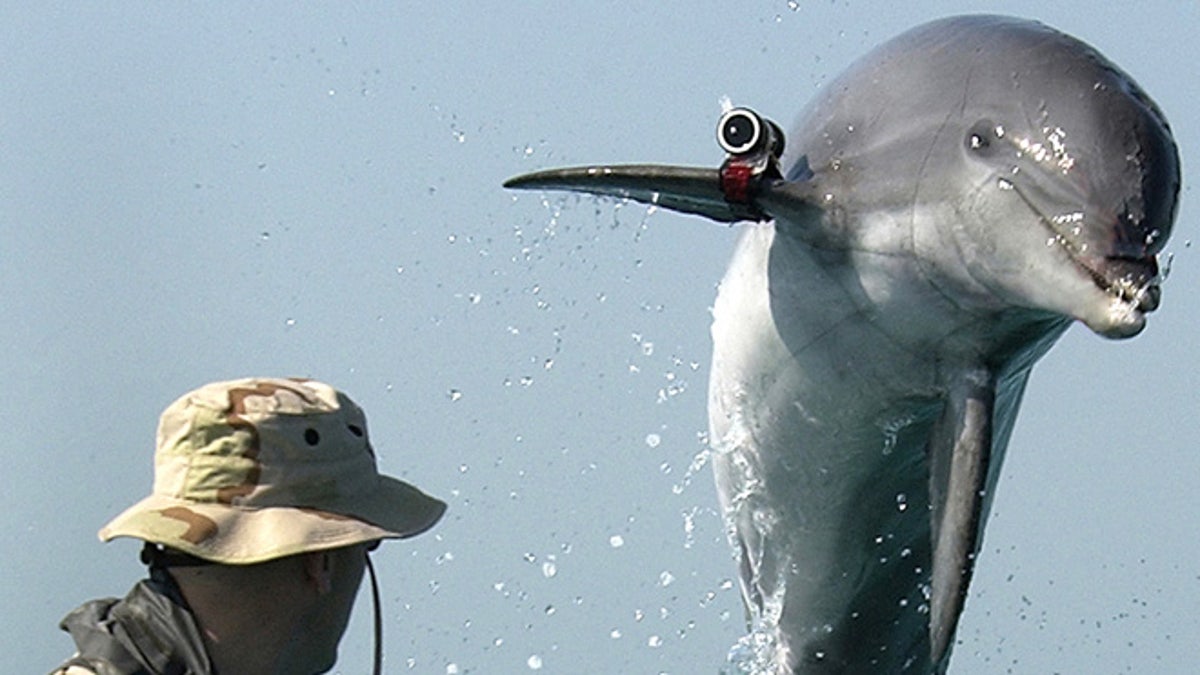
Mar. 18, 2003: A bottle nose dolphin trained by the U.S. Navy to detect mines leaps out of the water in front Sgt. Andrew Garrett while training near the USS Gunston Hall (LSD 44) in the Arabian Gulf. Attached to the dolphin's pectoral fin is a "pinger" that allows the handler to keep track of the dolphin when out of sight. (U.S. Navy / Photographer's Mate 1st Class Brien Aho)
A dolphin army with special knives or pistols fixed to their heads is not on the loose in European waters, a Ukrainian newspaper said on Wednesday.
A report in Ria Novosti made the outrageous claim Tuesday that trained dolphins from the Ukrainian Navy -- specially outfitted with weaponry -- had swam away from their handlers in February, probably hunting for mates.
[pullquote]
“Control over dolphins was quite common in the 1980's,” Yury Plyachenko, a former Soviet naval anti-sabotage officer, told Ria Novosti. “If a male dolphin saw a female dolphin during the mating season, then he would immediately set off after her. But they came back in a week or so.”
The report was a fraud, however, according to Anatoly Gobachev, director of the Ukrainian State Oceanarium.
- Will sea lion terrorist trackers help clear waters off Iran?
- Harvard snoops through professors’ email, teaches new lessons in privacy
- European porn ban rejected — barely
- Airwriting: ditch your keyboard and scribble on the stars
- 19 crazy critters from the cretaceous
- Man’s best friends: 7 amazingly trained animals
In a newspaper article from New Sebastol, Gorbachev explained that the Oceanarium was closed on the day the “deadly” dolphins made a break for it, as well as several days before that. And while there are six dolphins at the facility, they are all still safely in their cages.
The hoax nevertheless appeared to have taken in several news agencies including Huffington Post and The Atlantic, which published an apology for the error on Wednesday.
Ria Novosti has not altered its story, however, which still states that a military source in Sevastopol told the agency last year that the Ukrainian navy had restarted training dolphins to attack enemy combat swimmers and detect mines. The agency has reported in the past on the existence of the dolphins army, which is trained to attack enemy combat swimmers using special knives or pistols fixed to their heads.
There is at least a germ of truth to the story: Militaries have been known to train sea animals for a variety of purposes, including the U.S. Navy.
“Mammal systems” such as dolphins and sea lions have supported the U.S. Navy for more than 40 years. They were useful during the Vietnam War and Operation Iraqi Freedom, and they have engaged in counter-terrorist missions.
The U.S. Navy’s Explosives Ordinance Disposal team locates, identifies and disposes of mines from 30,000 feet in the air to 300 feet below the sea. It considers sea lions and dolphins superior to UUVs (underwater unmanned vehicles) for some of those missions.
Dolphin mine hunters cleared the entrance, waters and harbor of Umm Qasr, Iraq, to support the humanitarian aid mission in the Spring of 2003.